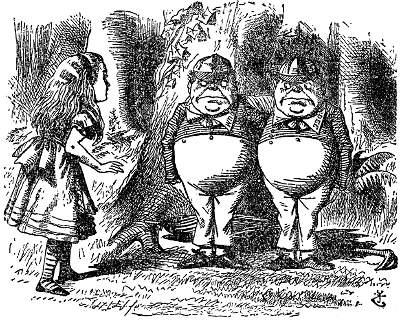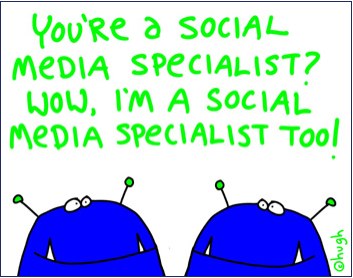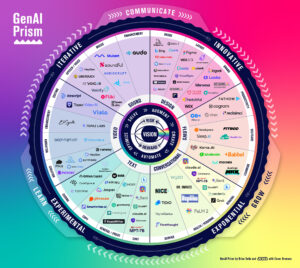
Perhaps Lewis Carroll was peering into the looking glass when he wrote “Through the Looking Glass and What Alice Found There.” In it, we were introduced to Tweetle Dum and Tweetle Dee, a curious duo that always shared a fruitful, entertaining, and complementary conversational exchange even though they always agreed to battle each other.
Some suggest that the significance of Alice’s encounter with the twins explores how curiosity leads to the unknown and therefore, may not be worthy of pursuit.
It’s just not safe right? These encounters either remind us why we’ve created a comfort zone or they challenge us to venture outside of it.
And if Tweetle Dee and Tweetle Dum were the executives to whom we report, then we can assume that our imagination and ambition, and any attempts to justify the value of new and social media, serves zero relevance and therefore will receive zero support.
As we’ve learned in Carroll’s book and through real life experiences, sometimes curiosity and experience reveal new and more effective and efficient ways to get from here to the ever elusive “there,” even though we ventured into the unknown.
Caution, however, isn’t something we throw to the wind. Within social networks and the blogosphere, the rules of engagement are currently in the process of definition. History serves as a foundation for intelligence. However, as historians evaluate events outside of their historical setting, in this case behavior in social networks vs. the efficiencies and lessons learned in the era of broadcast marketing, history ceases to be history and starts to transform into sociology. There’s much to learn, but we can’t grasp or master anything by sitting idly and watching the world pass us by. Nor, can we jump in with both feet and engage without observing how we effectively contribute value and also earn the relationships that spark communities, associations, and ultimately action and/or commerce.
I tend to forget that for every discussion that explores lessons learned, new directions, or the future of Social Media, many more are struggling with the reality of having to successfully initiate, implement and justify their foray into new media. Many are simply looking for the specific steps necessary to accomplish new and great things while tying strategies and tactics to real world business value.
Those responsible for green lighting a new pilot, campaign, or program may or may not be qualified to do so. And, those who are not competent will not readily or willfully admit so aloud. Instead, they’ll stand in the way as a desperate act of job preservation and attempt to direct it into oblivion, tangle innovation in a web of processes and aging infrastructure, or worse, denounce new ideas and recommendations out of fear or ignorance in the name of not rocking the boat and going with what they already know.
Thankfully, there are also those gatekeepers who are never content with the status quo and recognize opportunity and their chance to not only adapt and evolve along with their customers and influencers, but also help lead them to answers and insight to make more informed decisions.
We’re all learning. However, history, experience, and intuition will help save us from learning and progressing through friction and perpetual mistakes.
We are the champions…
Attack of the Social Media Experts

Credit: Hugh MacLeod
While many social media experts are capable of demonstrating the benefits of and processes for building and managing personal brands online, only a small, but growing group can share the step-by-step instruction and framework necessary to obtain buy-in from the most traditional or skeptical business executives and more importantly, craft, shape, implement, and develop calculated social programs that build valuable communities, inspire measureable activity, connect to the existing infrastructure that already works well, and continually demonstrates how these activities translate into indisputable sales and referrals.
It’s less important to know how to “tweet” and more important to use Twitter as an extension of who you are, what you stand for, and the value that you can add to the community. Tools are just that, tools. They will help you reach people and they always will. They’ll adapt. They’ll change. They’ll emerge and merge. And, many will simply vanish.
Yet, this new breed of social media “experts” are guiding those that employ or listen to them to run out and setup profiles on Twitter, create Facebook Fan Pages for their brand, build and deploy widgets for social networks, buy a Flip and start shooting and sharing videos, get a phone with video capabilities and start livestreaming everything you experience, and get a blog and blog! And, you can bet that this list will expand with every new and shiny service that debuts and gathers momentum.
Think about it for a moment…
Essentially, experts are purporting the use of new tools and not necessarily connecting businesses to their customers and influencers where and how they congregate and interact.
What if I told you to run out and get billboards; shoot and air a commercial on radio and TV; launch a banner ad campaign online; sponsor events, advertise in trade magazines and newspapers; blast press releases; send direct mail; spam inboxes; host focus groups; invest in retail end-caps; distribute coupons; start a contest; and create a mobile app? As you could imagine, the list goes on and on.
My point?
This list of action items represents the tools of the trade as well. If I added “social” to any one of those, you would probably have probably paid more attention.
We’re intrigued and infatuated with “social media” and we’re lured into the illusion of expertise through experimentation when we’re not quite sure of how our personal endeavors translate into the unique cultures, business climates, market challenges, competitor history, state of customer perception, an understanding of customer pains and requirements, and where they seek guidance.
We’re usually missing the “day in the life of” viewpoint and the “why should I listen to you” perspective in our strategy and execution, yet it’s supposed to serve as the core of anything and everything we do and should be doing.
There’s a reason why many champions lose a bit of glimmer and spirit when they create these disparate online presences and see very little, if any, return.
We tend to broadcast.
Case in point, my wife works for an important national organization where she is by default, the new media champion as well as the change agent who now carries the burden for learning and justifying everything associated with the experimentation and piloting of social media programs, from listening to content production and publishing to engagement. The onus and responsibility of vindicating the time and resources necessary to participate across multiple networks also resides with her.
She recently participated in a Webinar that advertised how to effectively manage and measure Twitter on behalf of her company. The Webinar featured some of the most visible and notable Twitter experts online today. While their advice was accurate and relevant, she left unfulfilled, uniformed and worse, further confused. The answers to her questions were unrealistic, generic, impractical, unsustainable, and fundamentally flawed for the business world. Worse, she also walked away from the experience with more questions and less direction. Unfortunately, she’s not alone.
Why?
There’s a stark contrast in the experience and expertise that’s earned through the process of establishing and promoting a personal brand and building prominence, cultivating an active and vibrant community, earning trust and loyalty on behalf of a company brand, and inspiring measurable action and transactions.
In truth, the social marketing playing field is rife with “experts” but starved of masters.
WILL THE REAL SOCIAL EXPERT
In a recent article in PC World, “Beware the Social Media Charlatans,” Robert Strohmeyer assumes an offensive position against the onslaught of these social lemmings, “So suddenly all those poseurs who might otherwise have bilked the hapless with offers of life coaching services or Feng Shui consulting have jumped on the social networking bandwagon.”
This isn’t new. Many of us have documented the rise of the new gold rush for years. To this day, you have experts who tell you everything except what to do specifically. I recently was referred to a post from Focus Research that insinuated that businesses needed to engage in 50 social networks in order to stay in business, “50 Social Sites That Every Business Needs a Presence on.”
This is simply foolish and irresponsible. Articles such as this demonstrate the lack of social mastery or expertise that is so critical to truly helping businesses connect with customers on the social web.
Will the real social media expert please stand up?
Truthfully, my inbox is riddled with promises of riches, fame, glory, bevies of new customers, and greater profits if I attend the next big hands-on training, workshop, webinar or conference that reveals the untold secrets and proven techniques of today’s leading social networkers and social media gurus.
Sound familiar?
- Join me for this one-time, life-changing event! You’ll learn:
- The hidden one-thirds follow/follower rule on Twitter
- How to attract legions of friends and followers
- How to get retweeted
- The confidential techniques for making viral videos
So, the real question is, how does this help you?
It doesn’t.
This activity demeans and cheapens the real promise, advantages, and possibilities that lay hidden underneath the benefits that initially appeal to individual vanity and ego.
There is far too much “me” in Social Media and not enough “we” in the Social Web.
Conversation Starters vs. Meaningful Exchanges
Any anthropologist or sociologist will tell you that before attempting to join any online society, we must conduct initial fieldwork to observe and document the culture, behavior, communication, customs, traditions and habits of its citizens. And before we can determine which networks we prioritize, we have to first “listen” to the conversations across multiple social networks to identify and discern relevant interaction versus worthless chatter.
Use the Conversation Prism to establish the Conversation Index.
Transformation begins with observation.
We need to spend more time listening and less time broadcasting or talking “at” people.
Disregarding the flagrant salesmanship and oily networking practices of typical social media consultants, we must realize that there are benefits to monitoring, observing, listening, communicating, and connecting.

Credit: Hugh MacLeod
Earning the attention of peers as part of an integrated B2B, B2C, or D2C (Direct to Customer) communications program necessitates a level of mastery that shares roots and certain tactical attributes with personal branding, but requires supplemental skills and talents that inspire and fuel relevant techniques and strategic vigilance that ultimately beget presence and mindshare.
No Hard Feelings, This is Just Business
The primary metric for business success is measured in profitability, not followers. However, the path to profitability is impeded by the tolls of customers and influencers who govern passage and direction.
While basic communications and personal skills factor into user engagement, they should be solely responsible for defining perception, reach, and persona.
While many preach personality, voice, and humanization of the corporate brand on social networks, there’s something to be said for mystique.
Being yourself or being present simply isn’t enough and many times, it can also take away from the persona that symbolizes the company and its products.
Would Apple maintain its magic if hired social media experts were transparently engaging with people on Twitter? Would Steve Jobs preserve his charisma if we as the public could freely access him through social networks?
I’m sure with the right strategist behind them, anything is possible. But, think about it. Simply having access to the company wherever, whenever through the voices and personalities of John or Jane Doe, how would that change your idea of Apple or Mr. Jobs?
In social media, participants will forever be at odds with the brands they represent. Who we are as an individual and who we are as a representative of a company aren’t always in harmony or unison. However, there is an attainable balance and it’s this balance that inflates and steers the impression of all brands involved on both sides of the conversation.
While we profess to inject a human element to those companies as a way of making them approachable and compassionate, we must assess our intended role and the advantages of engagement in the communities we wish to reach before our inaugural utterance or declaration. Then and only then, can we discover our bearing and trajectory.
Humanizing the brand is necessary, if and only if, a human voice will reduce or eliminate potential friction between the customer and the company. Otherwise, social strategies must personify the greater purpose, significance and symbolization of the brand and reinforce those traits through everything we contribute. We do so by also humanizing our existing and potential customers, gaining empathy and sincerity in the process. But we must do so at a profound measure through not only a deep-rooted comprehension of human nature and connections as it relates to our individual personality, but also an entrenched comprehension of perception management, brand shaping and reinforcement, and active counseling and guidance that leaves those you encounter more informed, aware, and fulfilled. We’re instilling the attributes that engender awareness, enthusiasm, and loyalty.
The shift from specialist to authority is driven specifically by experience and the activities that define your social portfolio. As a business professional seeking guidance, direction, and insight, become the person you’re trying to reach using the voice of the persona you wish to convey and fortify.
This is connectivity through inspiration. In the process, we become the very social media experts we sought to employ.
—
Connect with me on:
Twitter, FriendFeed, LinkedIn, Tumblr, Plaxo, Plurk, Identi.ca, BackType, Social Median, or Facebook
—
Kindle users, subscribe to PR 2.0 here.
—
Now available:
pr pr+2.0 pr2.0 public+relations marketing advertising interactive social+media socialmedia brian+solis social media media2.0 media+2.0 2.0 smo social+media+optimization marcom communication publicity twitter facebook myspace ning social+network guru expert alice







I’m with you, this industry needs someone to lead. But I think there are MANY people claiming to lead. There are people who practically live on the road, attending conference after conference, speaking as visionaries and industry leaders. However, as an emerging industry in a fairly democratic/level playing field, there are many voices with many individual perspectives.
What makes one a leader?
As someone who has been around the social media game for a while (paying clients, speaking engagements, etc), I call it marketing, because that’s what social media is. It’s just another channel to reach people to get them to buy stuff.
Most social media authorities are charlatans of the get-rich-quick in the comfort of your own home ilk. The deafening hype from 20-something know-it-alls is exhausting, which is why most of my peers stay out of the scene for the most part because there simply isn’t much value to what most people are selling.
Most people who actually know what they are talking about simply keep their heads down, working hard to collaborate with paying clients – keep a low profile and get the job done.
The pseudo-celebrity and navel-gazing in the social media space is sad, the funny part is that most marketing people out there have no idea who anyone is because everyone is an expert as you correctly state.
Most social media projects are brain-dead simple, it’s the creative that’s difficult, and most social media experts aren’t creative enough to come up with original campaigns.
There are great things ahead to come in the social media space, don’t get me wrong. I’m not a hater, I am simply tired of the hype and the lack of original thought prevalent in this particular small corner of the marketing universe.
Social media is not simply marketing since it impacts all functional lines of business. If anything it is simply part of customer experience management.
Nice post Brian.
I especially appreciated the point about doing a little online fieldwork and listening, listening, listening before uttering anything to online communities. I also agree with the following quote: “Humanizing the brand is necessary, if and only if, a human voice will reduce or eliminate potential friction between the customer and the company.” I can’t imagine any benefit my health insurance provider’s “brand” would gain from speaking to me in a human voice.
If you don’t want your customers to readily learn your business processes and the way they work a human voice won’t gain you much as a brand. It will likely increase rather than decrease friction. Perhaps part of becoming a social media authority is to know when not to use social media.
This is definitely a well thought out and accurate post, but I’m just sick of hearing people complain about ‘social media experts’
The problem is not the experts in the broad sense of the meaning, it’s these ridiculous people going around touting themselves as experts.
The way I see it… There’s nothing wrong if others are calling you an expert. Now, If you have to call *yourself* an expert, you’re probably not. Especially in the social media landscape where influence rules.
I find it interesting that you would post this right after a lengthy post on the 140 Character Conference. Is that a coincidence? Spending $1,000 to learn about twitter and be around twitter celebrities seems pretty close to what you’re describing here. Was it worth it?
I wholeheartedly agree with you. I’m equally fatigued by the get rich quick schemes that continuously pop up on twitter. Tobias Bowman of highposition.net just posted on my blog that you “get out what you put in to social media.” (http://www.socialherder.com/blog) That’s all a company needs to understand. It’s not rocket science.
As far as convincing an executive to use social media, that will only come with trust and a deep understanding of their needs, goals and business model. I think a lot of “experts” struggle with that absolutely necessary insight. I personally take more pleasure in figuring out why a client shouldn’t be on twitter than why they should.
For a business, it’s all about ROI. It’s hard to measure reputation (which can be affected by a social media campaign) and returns tied directly to that. A good executive understands the dilemma and tries it out anyway. An important key is mitigating their risk in the form of cost (keep it low) and time spent on SM (rather than more traditional avenues). Social media experts do the industry a disservice when they keep both unnecessarily high for their own benefit.
Essentially what it comes down to is this: We need to speak each others language in order to be effective. Just because you are proficient at one medium doesn’t make you an expert by any means. In fact, it might make you less of one. It comes down to a willingness to adapt, shift and learn by admitting you don’t know where this is going…but you are going to do your best to learn everything possible to turn it into an advantage for your company. I view you as an authority on PR and Social Media because I usually learn something from every post I read here. What’s your litmus test?
Brian, I would also venture that although the social media expert can be worrisome, there are a few others that we need to be concerned with as well. There is the person who has the green light to initiate social media within their organization but has no experience and actually can hurt the company more than the expert might. Or what about the marketing company or person who may handle one aspect of marketing for an org., and when asked if they can handle a social media project, they say that they can, but have no experience or authority or right in doing so. Again, another aspect where not having an expert can still have the same effect.
So it’s not just having the person who claims to be an expert or authority that can be the problem, its the person who might be tasked with social media because of faint knowledge, the person who claims knowledge and the person who has no business engaging in social media/marketing- that can set an org back just as much as if they had an “expert” too.
We need people to just step up and say either I’m learning, we’re learning or I don’t know. Companies can’t afford for people, experts, authorities or otherwise to learn social media at their expense..
Great post –
“We need to spend more time listening and less time broadcasting or talking “at” people.”
Listening is the crux, yet the most ignored in implementation.
Brian, thanks for your eloquence.
I’m a Chartered Engineer. That means I don’t fix your washing machine (although I’ll have a go!). It means I’m recognised as having attained the qualifications, the experience and the peer recognition of being a darn good professional engineer. CEng features on my business card.
I consult on social media or, more precisely, how to influence and be influenced. And there the accreditation stops. I can only strive to accrue reputation in this regard via blogging, word of mouth and running the marcomprofessional.com website (to which you syndicate of course). But as long as buyers remain poor at procuring social media expertise, the market for the charlatans, as you refer to them, stays buoyant.
My own stab at trying to expose the snake oil merchants without looking bitchy (an objective you accomplish very well) is a post titled “There is no such thing as a Twitter strategy” which in some way parallels your highlighting the “50 sites you MUST be on” approach to social media.
http://tinyurl.com/nosuchthing
Perhaps we need to write “The guide to procuring social media expertise for those who’ve never kept a blog, don’t ‘get’ Twitter and still print off their emails”? 🙂
Brian, you are a constant source of inspiration and thought provocation! It never ceases to amaze me that your chosen words often reflect the truth and insight that most people are afraid to utter. Thank you!
I have to agree, there has to be a distinction between the so called “social media experts” and real professionals doing a communication/PR and/or advertising strategy accordingly to each case. Its not a magical recipe where you open a twitter or Facebook account. There needs to be strategic planning behind it. A so called social media expert might be great understanding the tool, but the tool is just a tool until someone comes along and actually makes it useful.
This is really the truth about what is happening in our time. The web is saturated with pretenders.
The reputation of an expert, like a cult wine, is earned not bestowed. It is dangerous to the reputation of Social Media (and PR/Advertising, etc.) to represent oneself as something they are not. I see the seminars for Social Media education, review the presenter’s bio and truly wonder, besides chutzpah, what “expertise” are they pulling from. I think a grand dose of modesty is in order. We all want to learn, but not all of us should be teaching.
Pretty cool post. I just found your site and wanted to say
that I have really liked browsing your blog posts. Anyway
I’ll be subscribing to your feed and I hope you write again soon!
One of the best articles I’ve read this year. You hit the nail right on the head with this one.
Terrific commentary on the need to move from social media for the sake of social media to applying social media to drive tangible, meaningful results. True mastery is displayed by the ability to apply knowledge in a way that makes sense, and by being facile enough to take the “right” elements from the toolbox.
Nicely written.
Really enjoyed the article. I am completely overwhelmed by the amount of self-proclaimed social media experts that are out there that seem like they are trying to force “knowledge” on people. Thanks for putting in into perspective.
it was more than 140 characters, so I skimmed….
Who do you think is doing it well? Who /is/ the real authority?
Great read. I recently read a book that talks about your own personal brand and striving to be successful. http://www.bustingloosefromthebusinessgame.com I hope you like it.
Wow, insightful post. I think the people at AdWido know this kind of thing relatively well.
Interesting update to the discussion: http://mashable.com/2009/12/27/social-media-exp…
here's an unusual use of social media – check out Arbitrary Romance on facebook. The secret: a couple dozen of the funniest trans- Atlantic regulars from the Arbitrary Number of People Demanding Something Must Be Done fb site (been getting lots of media attention, check out The Guardian in December) co-administrate, meaning that no one knows who is writing what.